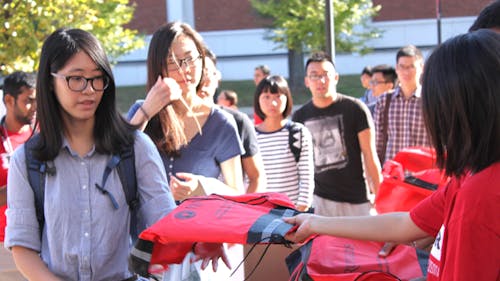International Education Week hopes to make students culturally literate

Chefs at Brower Commons taught students to prepare a Vietnamese soup and an Indian chicken dish last night at the “International Cooking Class,” the kickoff event for the 15th annual International Education Week.
IEW, a joint initiative between the United States Department of State and the U.S. Department of Education, begins today and runs through Friday, celebrating the diversity of American students studying abroad and international students studying in the U.S.
Organized by the Rutgers Centers for Global Advancement and International Affairs, in coordination with several departments and student groups, IEW at Rutgers is geared toward college students entering the global society after graduating.
Greg Costalas, senior program coordinator at the GAIA Centers, said the week is primarily an educational opportunity.
“It’s an opportunity for universities like Rutgers to share [information] about our international base, a chance for domestic students to learn about things, as well as an opportunity to experience different cultures on their own,” he said.
In order to help Rutgers students become more informed about other cultures, Rutgers-New Brunswick, Rutgers-Newark and Rutgers-Camden have scheduled events to promote cultural literacy while keeping IEW accessible to the entire state of New Jersey.
With the intent of sparking interest among students in different cultures, these events serve to provide a small basis for multi-cultural education.
Carissa Sestito, public relations specialist at the GAIA Centers, said IEW is meant to celebrate international partnerships.
“We’ve provided funding to student groups who are interested in displaying something with an international element, performance or any other activity to foster a type of cross-cultural environment,” she said.
While the GAIA Centers staff members recognize that studying abroad is not suited for everybody, they do believe that engaging with a new culture in a foreign setting is entirely beneficial, particularly in today’s global society.
Stephanie Perez, program coordinator at the GAIA Centers, acknowledged how diverse the University student body is. She believes that interacting with various cultures within the college setting is not a substitute for physically immersing oneself in a foreign country.
“[Students studying abroad] are getting whole new perspectives … different experiences with people from all around world,” Perez said. “You need that kind of perspective in order to solve a lot of things that are happening and to be a better global citizen when you get out of Rutgers.”
The timing of this year’s IEW is particularly fitting for Rutgers because the National Association of Foreign Student Advisers has just recognized Rutgers as one of four institutions to receive the 2014 Senator Paul Simon Award for Comprehensive Internationalization.
According to the NAFSA website, the award recognized Rutgers for having some of the most diverse and far-reaching approaches for creating and implementing models for campus internationalization.
“[Rutgers] won the award because we’ve been able to heighten our international engagement and global affairs across all three universities,” Sestito said. “It encompasses a lot of things, such as studying abroad, international education programs and others.”
Considering IEW is both a U.S. State Department initiative and a Department of Education initiative, the University’s celebration of the week is not simply a promotion to convince students to study abroad.
Latching on to the federal government’s initiatives by providing educational events, the GAIA Centers are not only using this week as a platform to inform students about the benefits of studying in a foreign land, but also of becoming more well-rounded before entering the workplace after graduation.
“It is about educating the population ... students have to have an understanding of how things work outside of the U.S.,” Costalas said. “This is a chance for students to get a sense of what’s going on outside of their comfort zone.”



